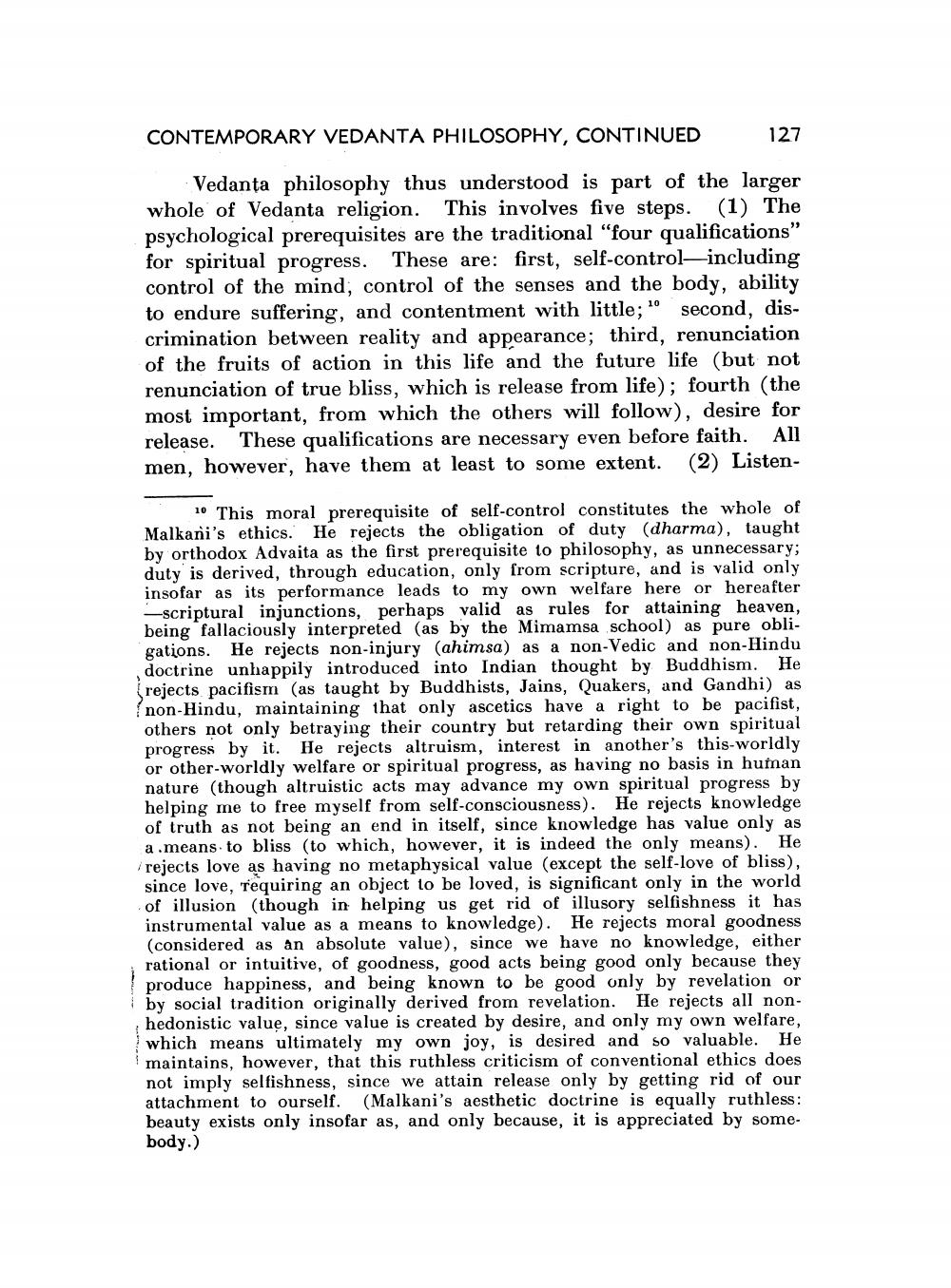Book Title: Contemporary Vedanta Philosophy Continued Author(s): George Burch Publisher: George Burch View full book textPage 6
________________ 127 CONTEMPORARY VEDANTA PHILOSOPHY, CONTINUED Vedanta philosophy thus understood is part of the larger whole of Vedanta religion. This involves five steps. (1) The psychological prerequisites are the traditional "four qualifications" for spiritual progress. These are: first, self-control-including control of the mind, control of the senses and the body, ability to endure suffering, and contentment with little; " second, discrimination between reality and appearance; third, renunciation of the fruits of action in this life and the future life (but not renunciation of true bliss, which is release from life); fourth (the most important, from which the others will follow), desire for All release. These qualifications are necessary even before faith. men, however, have them at least to some extent. (2) Listen 10 This moral prerequisite of self-control constitutes the whole of Malkani's ethics. He rejects the obligation of duty (dharma), taught by orthodox Advaita as the first prerequisite to philosophy, as unnecessary; duty is derived, through education, only from scripture, and is valid only insofar as its performance leads to my own welfare here or hereafter -scriptural injunctions, perhaps valid as rules for attaining heaven, being fallaciously interpreted (as by the Mimamsa school) as pure obligations. He rejects non-injury (ahimsa) as a non-Vedic and non-Hindu doctrine unhappily introduced into Indian thought by Buddhism. (rejects pacifism (as taught by Buddhists, Jains, Quakers, and Gandhi) as non-Hindu, maintaining that only ascetics have a right to be pacifist, others not only betraying their country but retarding their own spiritual progress by it. He rejects altruism, interest in another's this-worldly or other-worldly welfare or spiritual progress, as having no basis in human nature (though altruistic acts may advance my own spiritual progress by helping me to free myself from self-consciousness). He rejects knowledge of truth as not being an end in itself, since knowledge has value only as a.means to bliss (to which, however, it is indeed the only means). He rejects love as having no metaphysical value (except the self-love of bliss), since love, requiring an object to be loved, is significant only in the world of illusion (though in helping us get rid of illusory selfishness it has instrumental value as a means to knowledge). He rejects moral goodness (considered as an absolute value), since we have no knowledge, either rational or intuitive, of goodness, good acts being good only because they produce happiness, and being known to be good only by revelation or by social tradition originally derived from revelation. He rejects all nonhedonistic value, since value is created by desire, and only my own welfare, which means ultimately my own joy, is desired and so valuable. He maintains, however, that this ruthless criticism of conventional ethics does not imply selfishness, since we attain release only by getting rid of our attachment to ourself. (Malkani's aesthetic doctrine is equally ruthless: beauty exists only insofar as, and only because, it is appreciated by somebody.)Page Navigation
1 ... 4 5 6 7 8 9 10 11 12 13 14 15 16 17 18 19 20 21 22 23 24 25 26 27 28 29 30 31 32 33 34 35 36
